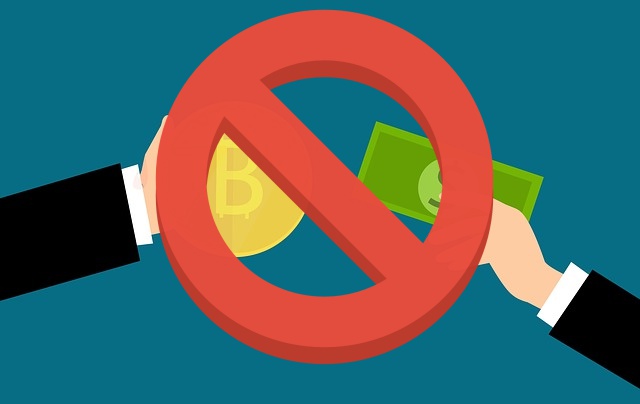List of Top 12 Countries Banned Cryptocurrencies
It’s been 10 years since the first cryptocurrency Bitcoin was born and still, new cryptocurrencies are developing to make evolutionary changes in our daily life.
Cryptocurrencies main aim is to provide easier and faster daily transactions by eliminating dependency on third parties.
Also, cryptocurrencies have their advantages and disadvantages.
Despite all merits and demerits, some nations in the world still consider cryptos are harmful to their economy, that is why they have taken a step to ban cryptocurrency usage in their territory.
In this post, I am not going to list all of those countries, but I’ll list out developed and developing countries.
1) China.

In 2017 China was Bitcoin hub, Renminbi(Chinese Yuan)-to-Bitcoin trades made up over 90%.
This crypto boom cause panic among the banking industry that’s why The People’s Bank Of China and several banks lead to banning cryptocurrency transactions using fiat money.
This action leads to 88 exchanges, and 85 initial coin offerings (ICOs) have ceased operations since.
However, trading or mining in bitcoin is not illegal to common citizens, only banking institutions and employees are banned from engaging in bitcoin business through banking, as well as servicing or doing business with the bitcoin industry.
Now, all of the world’s major players are no longer in China – all forced to seek new homes across Europe and the Americas.
2) Bangladesh.

If you make any crypto transactions in Bangladesh that could lead you to a punishment of up to 12 years in prison.
According to their Foreign Exchange Regulation Act, 1947, Anti Terrorism Act 2009 and Money Laundering Prevention Act, 2012, bitcoin is decentral payment system which could lead to people being “financially harmed”.
Here is a full statement of Central Bank of Bangladesh towards cryptocurrency regulations.
The ban comes as an enforcement of sections 4,5 and 8 of the 1947 law that regulates trading in foreign currency without authorization or general permission from the central bank.
Section 5 severely restricts payments did outside Bangladesh, which affect bitcoin payments.
3) Saudi Arabia.

In 2018 a committee consisting of the Capital Market Authority (CMA), Ministry of Interior membership, Ministry of Media, Ministry of Commerce and Investment and Saudi Arabian Monetary Authority (SAMA), released this statement about cryptocurrency regulations.
These committee state that cryptocurrencies are having negative consequences and high risks on the traders and they are out of government supervision, also there are no parties in the Kingdom that are licensed to trade virtual currencies such as Bitcoin and warns all their citizens and residents of trying to chase after them and other “get-rich schemes”.
However, Saudi Arabia seems to be banning cryptocurrencies, but blockchain technology itself has been adopted rapidly in Saudia Arabia.
Ripple and the and Saudi Arabian Monetary Authority (SAMA) offered a pilot program for Saudi banks. By doing so, Saudi Arabian banks are hoping to improve their payment infrastructure using Ripples payment system.
4) Bolivia.

In 2014 Bolivian central bank El Banco Central de Bolivia state that citizens are prohibited any currency that is not previously approved by their national institutions.
central bank statement:
It is illegal to use any kind of currency that is not issued and controlled by a government or an authorized entity.
The bank believes that the ban is necessary to protect the Bolivians, the country’s national currency, and to safeguard users from the kind of uncontrolled currencies that can lead to the users losing their money.
5) Iceland.

In 2014 the Central Bank of Iceland issued a statement explaining the legal status of digital currency in Iceland.
Statement state that the digital currencies are not compatible with the country’s Foreign Exchange Act and Iceland seek to protect against the outflow of Icelandic currency from the country.
But the country has seen a new cryptocurrency called Auroracoin. Its founders wanted to create a viable alternative to the present Icelandic banking system.
6) Thailand.

According to the news reports, The Bank of Thailand issued a circular asking “financial institutions not to get involved in cryptocurrency transactions for fear of possible problems from the unregulated trading.”
Thailand main motive behind this ban is cryptos may be used in illegal activities such as money laundering or supporting terrorism.
But recently, the Thai Securities and Exchange Commission (SEC) announced a list of four approved cryptocurrencies that can be legally used for investing in initial coin offerings (ICOs) and as base trading pairs against other cryptocurrencies.
SEC wrote:
Currently, there are four cryptocurrencies that can be used for base trading pairs. They are bitcoin (BTC), ethereum (ETH), ripple (XRP), and stellar (XLM).
However, this approval does not make these coins legal tender that can be used to pay off debts.
7) Egypt.

On January 1, 2018, Shawki Allam, the current Grand Mufti of Egypt, said that cryptocurrency trading is forbidden under Islamic religious law due to the risk associated with the activity.
Apart from its trading volatility, Shawki Allam also cited bitcoin’s anonymity as a cause for concern, saying it can undermine the legal system by enabling tax evasion, money laundering, fraudulent activities, and terrorist financing.
Also, the Central Bank of Egypt issued a warning in January 2018 against the trading of cryptocurrencies, due to the extremely high risk associated with cryptocurrencies.
But Egypt is still at a nascent stage of the cryptocurrency market, comments from Allam are similar to comments made by secular government bodies.
8) Vietnam.

Back in February of 2014, Vietnam banned the virtual currency bitcoin for use by credit institutions. The reason is that cryptocurrencies use for criminal purposes and its high risk for investors.
In 2017 The State Bank of Vietnam ordered Bitcoin and other virtual currencies are not legal means of payment. That effectively also outlawed the issuance, supply and use of cryptocurrencies. If anyone is active in crypto trading, they face fines of up to 200 million dong (around US$9,000).
Recently, Some news media also reported that the government is trying to establish a legal framework for cryptocurrencies. It seems now they want to streamline and monitor the industry.
9) Ecuador.

The Central Bank of Ecuador banned cryptocurrency activities stating cryptos are not backed by any authority, because the value is based merely on speculation. Furthermore, financial transactions with cryptos are not controlled, supervised, or regulated by any Ecuadoran entity, and therefore they represent a financial risk for those who invest in them.
However, purchase and sale of cryptos such as Bitcoin through the internet are not banned, but it reiterated that cryptos are not an authorized payment method for goods and services according to the Código Orgánico Monetario y Financiero (Organic Monetary and Financial Code).
10) Taiwan.

On 31 December 2013, The Financial Supervisory Commission (FSC) and CBC issued a joint statement. It is stated that bitcoins remains highly volatile, highly speculative, and is not entitled to legal claims or guarantee of conversion.
After that in November 2015, The Chairman of the Financial Supervisory Commission (FSC) has declared Bitcoin to be illegal in Taiwan, because of recent high-profile kidnapping accident involving ransom demands made in Bitcoin.
Despite ban many people in Taiwan trade cryptocurrencies anonymously on exchange platforms, to solve this problem now country’s FSC has the power to crack down on anonymous crypto transactions.
11) India.

In April 2018, Reserve Bank of India ask for banks to stop dealing with cryptocurrencies, the reason behind this decision is to improve efficiency and inclusiveness of the financial system also considering consumer protection.
But some Indian exchanges questioned this move taken by Reserve Bank in Supreme Court.
Effect of this ban, one of the Indian biggest crypto exchange Zebpay closes their activity in September 2018.
But still, RBI formed a committee to guide the desirability and feasibility to introduce new central bank cryptocurrency. The report will be submitted by the committee soon.
On March 4 2020, the Supreme Court lifts the Reserve Bank ban on banks for doing crypto activities.
In a 2022 Budget session on the parliament, finance minister Nirmala Sitaraman said they’re going to tax any virtual currency transfer at 30%. She also proposed a 1% tax deduction at source on payments made related to the purchase of virtual assets.
And she clarified that this move is not considered cryptos as legal tender. But the nation’s central bank has been testing its CBDC through several controlled trials for several months in the country and has been examining its impact on the banking and monetary systems.
12) Russia.

On November 2016, the Federal Tax Service of Russia declared that bitcoin is “not legal”.
In September 2017 Russia central bank head Elvira Nabiullina has said it is categorically against regulating cryptocurrencies as money.
Deputy Finance Minister of the Russian Federation Alexei Moiseyev at the same time said it’s “probably illegal” to accept cryptocurrencies payments.
However, bitcoin market sites are blocked and in court decisions stated that bitcoin is a currency substitute which is outlawed on the territory of the Russian Federation.
Recently, Moiseyev said that the finance ministry had met with the Russian central bank and the Federal Security Service, the nation’s security agency, to discuss the cryptocurrency bill. There is a high possibility of allowing crypto trading in upcoming legislation.
Conclusion.
Above is the list of big countries banned crypto activities.
If you noticed most countries are not banned cryptocurrencies entirely, only banking ban is their, because banks always not agree with a decentralized currency system.
But they cannot deny to use Blockchain in future which runs cryptos also usable in many areas.
That is why it is interesting to see next step of these countries in future.
Write your opinions in the comment section below.
Here is a full list of countries banned cryptocurrencies.

Very useful information
Thank you.